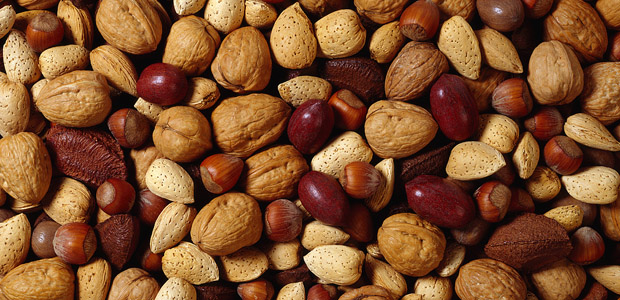Advertisement
Let’s Go Nuts!
Nuts are nutritious! For years people assumed they should avoid nuts. They feared that the high fat content might contribute to a high blood cholesterol level, which in turn could lead to heart disease. It’s true that nuts are high in fat, but the majority of that fat is the heart-healthy monounsaturated or polyunsaturated type. … Continued

Nuts are nutritious! For years people assumed they should avoid nuts. They feared that the high fat content might contribute to a high blood cholesterol level, which in turn could lead to heart disease. It’s true that nuts are high in fat, but the majority of that fat is the heart-healthy monounsaturated or polyunsaturated type.
Recent research into how certain types of fats affect our blood cholesterol levels and risk of heart disease shows that some fats are better evaluated by quality rather than quantity. Plant based foods, like legumes, grains, fruits, vegetables, nuts and seeds contain primarily monounsaturated and polyunsaturated fats (if they contain fat at all).
Researchers from the Harvard School of Public Health, Cornell University, Stanford University Department of Medicine, Cancer Research Institute of Hawaii and Johns Hopkins University have confirmed what our ancestors knew all along about the nutritional benefits of nuts and legumes. They all agree that regular consumption of nuts and legumes decreases the risk of heart disease. Other studies have confirmed that including nuts in the diet lowers total blood cholesterol, including low-density lipoprotein (LDL), the bad cholesterol.
Dr Gene Spiller of the Health Research and Studies Center in Los Altos notes that the nut’s healthful combination of good fats, fibre, vitamin E, copper, magnesium, zinc and arginine-rich protein contributes to its ability to lower blood lipids and reduce oxidation of LDL cholesterol.
Not All Fat is Bad
Our obsession with avoiding fat can be harmful, particularly for diabetics. Although people with type II diabetes have a two to three times increased risk of heart disease, lowering their fat content can exacerbate other risk factors for heart disease such as elevated triglycerides and lowered high-density lipoprotein (HDL), the good cholesterol. Nuts can help decrease the risk in their diets.
In addition to having a high proportion of monounsaturated fats, some nuts contain significant levels of alpha-linolenic acid, a key essential fatty acid (EFA) that is often deficient in our North American diets. Walnuts are the main non-fish source of this fat. It has been shown to reduce cholesterol and improve immunity, skin disorders and hyperactivity. In a study from Loma Linda University, men with normal cholesterol were given walnuts instead of foods high in saturated fat. They had a 12 percent drop in blood cholesterol and a 16 per cent drop in LDL cholesterol.
Essential fatty acids in the blood can reduce platelet stickiness and reduce vulnerability to arrhythmia (irregular heart beat) and cardiac arrest. Alpha-linolenic acid also reduces the chances of blood clotting, thereby reducing the risk of strokes.
Nuts are high in protein–particularly arginine, which has been shown to improve wound healing and immunity. In addition, Dr Dawn Johnson O’Byrne from the University of Florida states that nutrients found in nuts, including potassium, phosphorus, magnesium, zinc, manganese, copper and vitamin E, are vital for the proper function and health of muscles and bones. They also protect against free radical damage. Nuts in the shell can be stored without refrigeration and eaten conveniently as snacks.
Nutty Goodness
The insoluble fibre in nuts helps to alleviate constipation and reduce the risk of colon and rectal cancer. Soluble fibre helps reduce blood cholesterol and blood sugars, thereby reducing the risk of heart disease and diabetes. Nuts also contain many phytochemicals (notably saponins and sterols) which act as antioxidants. Nuts, particularly Brazil nuts, are good sources of selenium, an antioxidant that plays a key role in reducing the risk of certain cancers (prostate, colon and lung).
Nuts contain all of the good things that meats contain (protein, B vitamins, iron, zinc, calories) but none of the bad (saturated fat and cholesterol). This puts them in the meat and meat alternate group, but their many advantages over meat should put them in a category all their own.
In addition, nuts contain many more positive nutrients than meat. They provide calcium (particularly almonds), selenium (particularly Brazil nuts), magnesium and folate (hazelnuts).
It’s clear that nuts can contribute to a healthy diet and improve Canada’s nutritional profile. Eat them raw in a trail mix. Sprinkle them on salads or pastas. Grind and cook them in a loaf or burger. Make a crust for fruit pies. Nuts can be enjoyed just about anytime, anyplace.
[Editor’s note: The good oils in roasted or browned nuts have been damaged by high heat and should not be consumed.]




